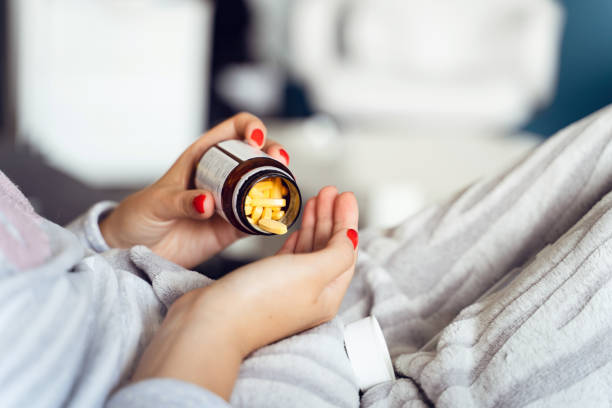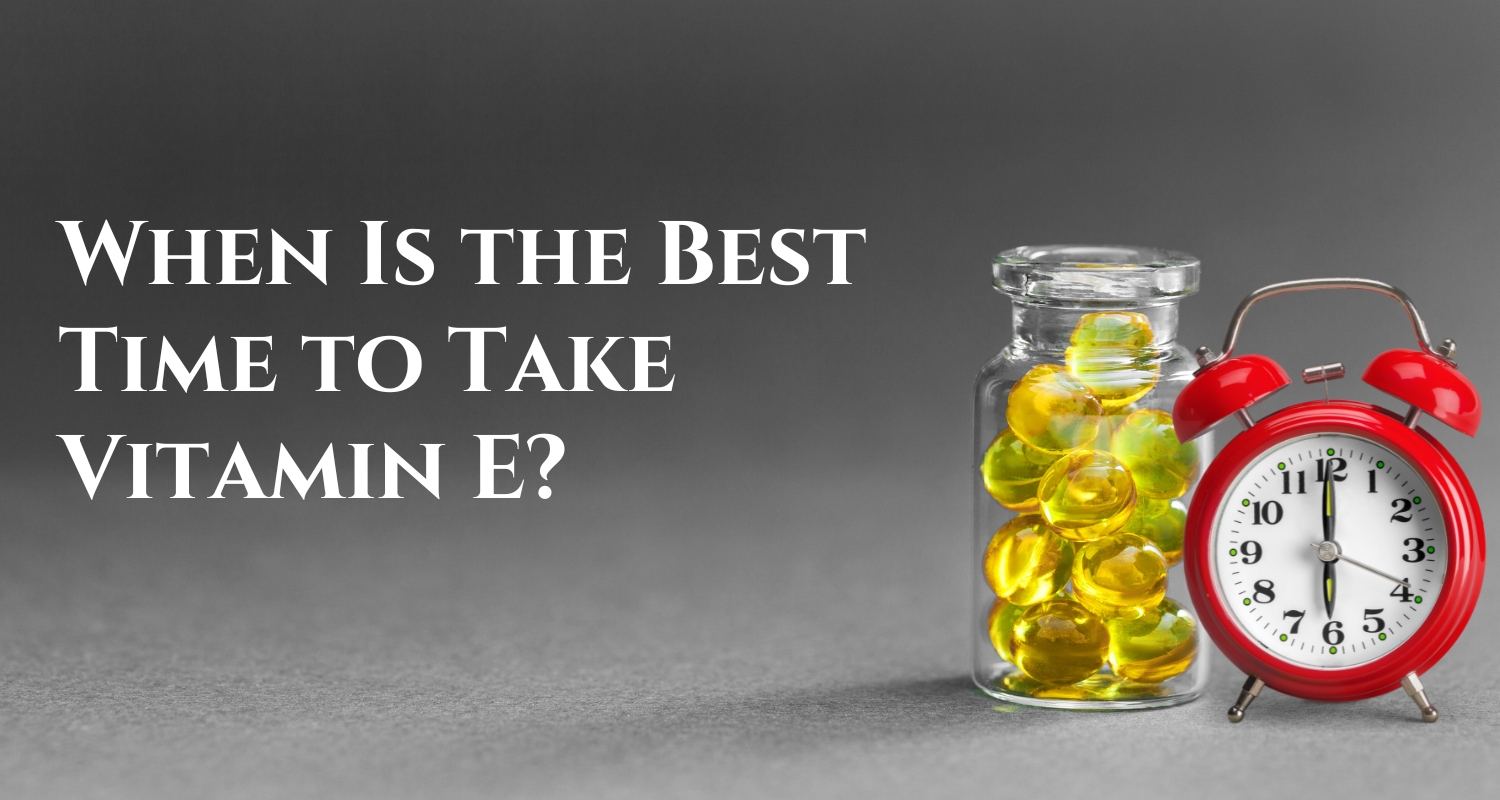One thing that makes Vitamin E the first choice for many is its antioxidant effects. Also, it plays a major role in protecting against oxidative stress and maintaining your overall health. Unfortunately, many struggle to determine how to incorporate this essential nutrient into their daily regimens.
This guide answers questions such as when is the best time to take Vitamin E and the best practices for Vitamin E consumption, with particular attention to factors determining its absorption and effectiveness. If you’re an enthusiast for health or looking to enhance your well-being, knowing when it is best to take Vitamin E will take one step toward living a more nutritious life.
Understanding Vitamin E
Vitamin E is not just a basic single vitamin. As a fat-soluble antioxidant compound family, it is found in nature and added to many food products or dietary supplements. For a long time, people have known of vitamin E’s benefits besides skin care and eye care. It can also improve the immune system and even help brain health!
What Is Vitamin E?
Vitamin E is a diverse category of eight chemical substances called tocopherols and tocotrienols. Each has multiple effects on the life processes of humans. Alpha-tocopherol is the most common type of Vitamin E.
Alpha-tocopherol is famous for its strong anti-oxygen ability to neutralize the body from free radicals, preventing lip and protein destruction. This is not just anti-aging — it also slows down aging processes while offering protection against DNA, protein, or lipid damage, thus contributing to overall cellular health management.
Benefits of Vitamin E
Vitamin E’s benefits are both ample and varied. Well, the next question that might come to mind is why take vitamin E? Well, as an antioxidant, it helps offset the oxidative stress that leads to many chronic diseases, such as heart attacks and cancer; as an immunomodulator, it strengthens the immune systems of old people against numerous pathogens.
For neurological functions and preventive measures against Alzheimer’s; skin protection with a shield against ultraviolet radiation damage and improvements in texture; and anti-inflammatory properties to relieve symptoms associated with arthritis ailments. This form of vitamin E is more potent than the other forms, particularly for use in your body. You would do better to use vitamin E supplements when taking this supplement.

Factors Affecting Vitamin E Absorption
What you eat, your health status, the weather, air quality levels, and other factors can all influence how much of a particular nutrient–such as Vitamin E gets used by your body.
Dietary Considerations
Vitamin E absorption depends heavily on dietary fat intake. As a fat-soluble vitamin, Vitamin E requires fats to be properly absorbed into the blood, and meals high in healthy fats, such as olive oil, nuts, and avocados, can greatly increase absorption rates. While it may pose a blockage of absorption, processed or high levels of unsaturated fat can do the contrary.
In addition, natural forms of Vitamin E (d-alpha-tocopherol) tend to be better absorbed than synthetic versions (dl-alpha-tocopherol).
Interaction with Other Nutrients
Vitamin E is not to be taken alone–its interaction with other nutrients determines how effective it is in your body. For example, Vitamin C recycles Vitamin E, and thus, the overall antioxidant capability of both materials increases.
Selenium and iron also play integral roles in how our bodies use Vitamin E. Excessive fat-soluble vitamins such as A or K can interfere with absorption, causing symptoms of scarcity when taken in excessive amounts or imbalance.
Individual Health Conditions
Health circumstances are vital to how well Vitamin E can enter the body. Sicknesses that involve fat digestion, like Crohn’s disease, cystic fibrosis, and liver diseases, may interfere with its entry and so sink not into one’s body as a lipid-soluble vitamin (which it is) but is used elsewhere.
It’s another story if you’re elderly. The older body changes as digestion and metabolism alter; thus, Vitamin E may not be absorbed as efficiently as before. Genetic factors can affect how much Vitamin E you may take in, and these seem to differ among different races. So, to get your daily supply of vitamin E, ask a healthcare professional before the food.
Understanding these factors means you can make intelligent decisions about individual health and dietary needs and choose the proper vitamin E regime.
Best Time to Take Vitamin E: Morning or Night
Ascertaining the best time of day to take vitamin E involves more than just knowing which hour the sun rises; it involves understanding your body’s rhythms and how this nutrient interacts with food and other supplements (and yourself if you’re a woman).
Vitamin E, as a fat-soluble vitamin, needs some fat to be best absorbed. That is why the hour of your uptake can spell the difference between 70% use or only 30%.
Benefits of a Morning Routine
Taking vitamin E in the morning has its advantages. For many, mornings are a time of routine, and it’s easier to remember to take supplements. Taken with breakfast, including healthy fats– eggs, nuts, or avocados, for instance – and vitamin E would be absorbed better.
Furthermore, taking it in the morning provides all-day protection against oxidative damage. In other words, you will be protected if free radicals start flowing today. At least some research supports the idea that taking this nutrient in the morning can carry on throughout the day and maximize health benefits with foods rich in other nutrients.

Evening Benefits
Likewise, the evening is also the time people need. While you slumber, the body repair mechanisms will step on their gas and charge into high gear. This biological rhythm of restoring things to health might mean taking Vitamin E at night.
Besides that, is there a chance it will indeed be helped even more beneficially by its effects on skin and cells? Also, for the person who eats dinner as their biggest meal of the day, particularly in fat content, taking Vitamin E at night could mean a better supply.
Those medicines you take in the morning, which may interfere with vitamin absorption and even supplementation, could benefit the people with these problems the most.

Individual Considerations
The ideal time to take Vitamin E will depend on many factors, including the individual in question. As with some of us, those with digestive problems may benefit from taking it at another time of day.
Another thing is that those who tend to eat the most fat may take it at the best time of day. They want to ensure Vitamin E receives these necessary components for optimal absorption.
Personal schedules, how the same day is typically staked out by meals, and even which form of Vitamin E supplement to use can change when it’s best. Your healthcare provider can serve as a resource for helping you to place Vitamin E effectively into routines for better health.
Comparing Morning vs Night Intake of Vitamin E
Morning or night, when is the best time to take Vitamin E? This question might strike your mind regularly. Well, understanding the optimal point for taking vitamin E is determined by a complicated amalgamation of factors, and preferences greatly align with individual lifestyle and physical clock. The morning and night each have unique advantages, but by taking a fresh viewpoint, new elements can be envisaged so that you make an informed choice.
Impact on Metabolic Processes
When is the best time to take Vitamin E? Either in the morning or at night, the body’s metabolic processes are affected in different ways, each with potential benefits. Knowing these effects can help you adjust your supplement intake to fit your body’s natural rhythms.
Morning: Taking vitamin E in the morning may coincide with the body’s natural metabolic peak. Because the metabolic rate is generally higher in the morning, nutrients would be used more efficiently by the body, leading to easier absorption and integration into the body’s natural antioxidant defenses.
This timing would overlap with the body’s circadian rhythm, ensuring that cellular repair and renewal processes proceed optimally throughout the day.
At night: Instead of dismantling cells, the body enters an interlude of restoration and recovery. By adding Vitamin E to your daily regime at night, you can help these vital activities go further and bring benefits to both skincare and cellular health.
Since the body now concentrates on repairing itself, Vitamin E might engage in addition to its power in quelling oxidative stress, which is the product of a full day’s accumulated load of pro-oxidants and could thus raise overall antioxidant capacity.
Influence on Dietary Patterns
Your normal dietary schedule may majorly affect how you take Vitamin E. Whether you get up early to prepare breakfast or stay in bed late but then don’t eat until dinner–such habits play a prominent role in our lives.
Morning: Mornings, for many, are the most organized and routine part of the day, making it an ideal period to establish a regime of vitamin E consumption. If you have your breakfast with vitamin E, absorption by dietary fats can be ensured by this fat-soluble Vitamin.
People involved in this lifestyle may find it suits them as a given: a part of daily bread after breakfast, enabling the hectic pace of day-to-day life just as well.
Night: This is probably a good idea for those who have little to do with their health routines in the evening. They might as well have to have enough time for eating. So why not take it down at night? In the evening, a few people take supplements at all As they think it will allow them to be more careful and deliberate about their health practices.
Finally, when it comes to high-fat meals late in the day, evening doses of Vitamin E may offer better absorption. Nutrients are absorbed better at that time, whether they be beta-carotene, carotene-like compounds, or natural tocopherols.
Psychological and Behavioral Considerations
Our mindset and behavior every day are strong factors in the effectiveness of taking Vitamin E. Whether it is a part of the morning routine or a night-time ritual, the psychological and behavioral aspects deserve attention, from ensuring a consistent intake to guaranteeing that we are taking enough multiple times throughout each day.
Morning: Getting off to a good start in the morning is helpful for A positive day. If we add Vitamin E to this routine, we will keep ourselves in an active and healthy state of mind. This psychological benefit is that it might prompt its beneficiaries to maintain a regular supplementation schedule, thus ensuring consistent and long-term effective intake of Vitamin E.
Night: On the other hand, health-related activities, such as taking Vitamin E, provide a sense of achievement and care at the end of the day. It can serve as a relaxing ritual that allows people to calm down. Health targets a long day and appreciates the importance of possibly bringing better sleeping, too, if they know in their hearts and minds that this is a step supporting their health.
In addition, the advantages and limitations of both morning and night Vitamin E are distinct. Personal inclinations, way of life, food habits, and state of mind all contribute to picking the most appropriate time. Understanding such distinctions can help individuals make their own choices per health goals and daily routines.
Best Practices for Vitamin E Intake
Modifying the proper techniques for Vitamin E intake (that is to say, how and when is the best time to take Vitamin E) falls not only to your particular way (your routine of living) but also takes both safety and effectiveness into account. As an essential nutrient, vitamin E, as do all other things, requires balance.
Integrating Vitamin E with Dietary Sources
While supplements for Vitamin E are a common way to boost its intake, their combination with natural food materials in the everyday diet offers more benefits. Foods rich in Vitamin E, like almonds, sweet potatoes, spinach, and avocados, provide complex nutrients that work in concert. Eating from a variety of these sources will ensure a balanced intake of not only vitamin E but all the other essential elements as well.

Understanding Individual Needs
Each person’s body is different, and thus, so are their nutritional requirements. Factors such as an individual gender, age, health status, and lifestyle can all influence how much Vitamin E a person needs. For some people, a standard supplement dose will be enough.
For others, more or less may be needed. It is very important to understand your body’s needs – and the facts can best be ascertained from your health professional, who can provide advice tailored to your health profile.
Synergy with Other Antioxidants
Furthermore, taking in conjunction with other antioxidants, such as Vitamin C, which can regenerate Vitamin E and reinforce its antioxidant properties, is better for d-alpha-tocopherol. Selenium is another nutrient that works well with Vitamin E. Through a varied diet or proper choices of supplements, building a balanced antioxidant network significantly enhances the effectiveness of Vitamin E and makes it work better.
Monitoring and Adjusting Your Input
It’s important to be vigilant over any changes in your lifestyle or state of health. Just as your need for Vitamin E food will likely change when you get sick or old, there’s no scientific reason that it won’t do so in the future. Regularly monitor how much your body produces in response to a certain level of Vitamin E, and adjust intake accordingly.
This is particularly important with supplements because excess Vitamin E intake can adversely affect your health. Where Vitamin E levels are concerned, get in touch with a qualified folic acid expert to make sure you’re receiving the right nutrition.
Educating Yourself on Quality and Resources
Not all Vitamin E supplements are the same. In today’s market, knowing who offers good quality and who doesn’t is hard. You can spot supplements that are not up to Educational standards if they offer Vitamin E in its synthetic form (dl-alpha-tocopherol) instead of the natural form (d-alpha-tocopherol).
This is because the natural form is less irritating to people and easier for the body to utilize. Yet another thing to watch out for is where the Vitamin E comes from. Who is producing it? As some people have allergies to certain substances, such as soybeans, you need to be careful.
Conclusion
When it comes to taking vitamin E, there are a lot of variables to consider, such as one’s diet, health status, and daily activities. One might take advantage of the body’s natural healing cycle in the evening, while the other could be better absorbed with breakfast in the morning.
Regardless of the exact schedule, the most essential thing is ensuring you take it consistently daily. Get on board with the path to greater health by consulting an expert healthcare professional to customize your vitamin E consumption to your specific requirements.
Frequently Asked Questions (FAQs)
Let us check some of the commonly asked queries related to Vitamin E and the best time of day to take Vitamin E.

